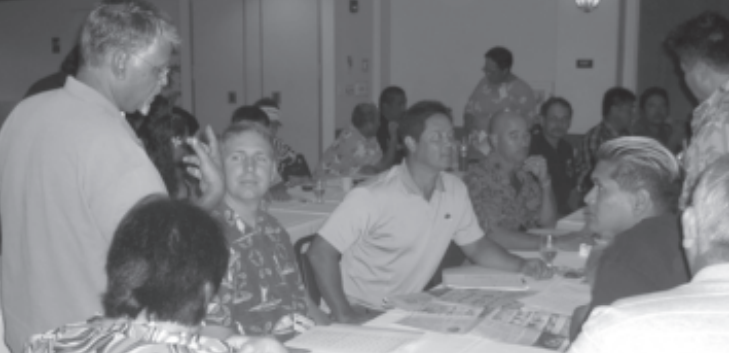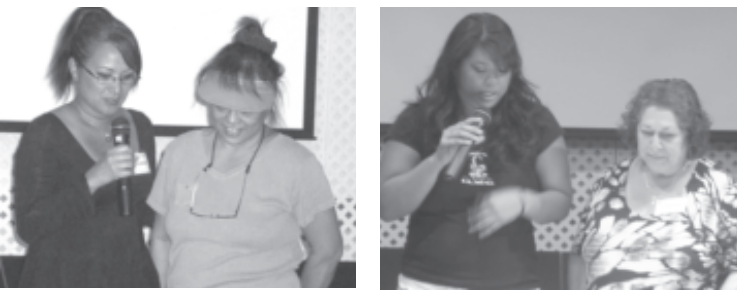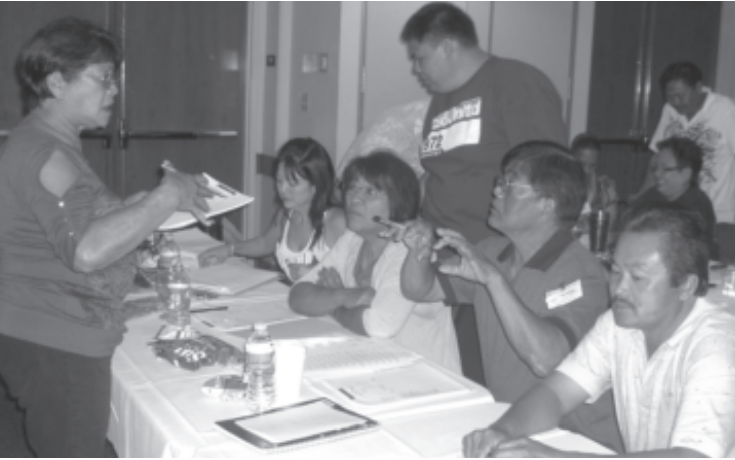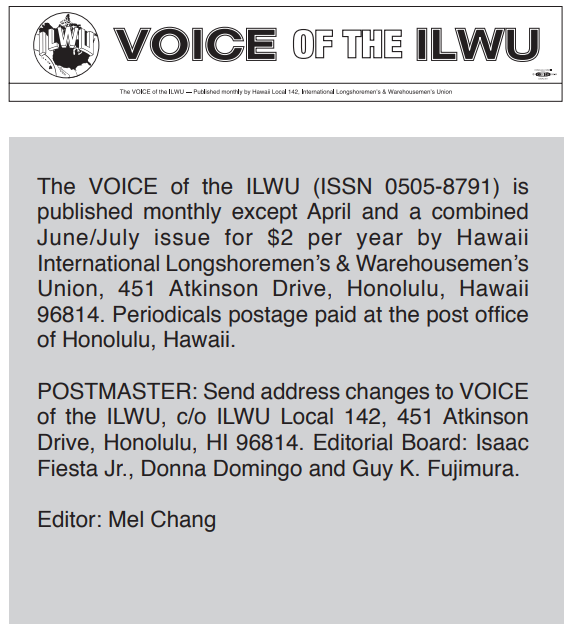WAILUKU—The 2010 ILWU Tourism Caucus was the first time in 20 years where unit leaders from ILWU hotels and golf courses met together to talk about common concerns and develop a unified plan for their contract negotiations.
The caucus was held at the Maui Beach Hotel on September 27 and 28 and was attended by over 120 leaders from 39 ILWU hotels and golf courses. Another 24 ILWU business agents, Local 142 and division officers, and staff attended the caucus.
Local 142 President Isaac Fiesta, Jr. opened the meeting by explaining the caucus would cover the status of the hotel industry pension fund (which includes many golf courses), the impact of the new national health care program on our medical plans, and how the union and union members must mobilize and prepare for contract negotiations.
The caucus was held well in advance of most contract expiration dates to give units plenty to time to mobilize their membership. Only two hotels are negotiating in 2010 and three hotels and five golf courses are negotiating in 2011. The most important years for ILWU tourism negotiations are 2012 when over 10 units and 2,200 members will be negotiating new contracts and 2013 when over 8 units and 3,400 members will be in negotiations.
Pension Fund
One reason for the early timing of the caucus was to give tourism unit leaders a detailed explanation of the health of the Hotel Industry-ILWU Pension Fund. Earlier this year, over 6,800 members received a notice that their pension plan was classified as “critical” in 2010 because its funding position fell below levels specified by new governmental requirements.
These requirements are the result of the Pension Protection Act of 2006 (PPA). The PPA was passed to require defined benefit pension plans to be well funded. This was intended to protect the Pension Benefit Guaranty Corporation (PBGC) which is set up by the federal government to guarantee pension benefits. If a pension fund fails, the PBGC takes over and pays the benefits to retirees and future retirees. The new funding requirements were developed to almost guarantee the PBGC would never have to take over a pension plan and would never lose money in the future. However, no one imagined the financial crisis and stock market crash in mid-2008 to early 2009.
In 2008, the ILWU pension plan assets were over 90 percent of its liabilities, but the 30+ percent loss in the stock market in 2009 caused a large drop in value of the plan’s assets. Because of the stock market losses, Congress adopted legislation that delayed the Pension Protection Act requirements until January 1, 2010, which triggered the “critical” status, the notice to ILWU members, and the rehabilitation plan which must be adopted by the pension trustees.

Kauai Division Director Michael Machado explains how ILWU units need to have a negotiating committee which meets with management and a separate mobilizing committee to keep members informed and to build solidarity. The recentlyorganizedSt.RegisPrincevilleResort andthePoint atPoipuonKauai are new to unionism and have a lot to learn about how the ILWU operates. (L-r) Machado, Scott Bacon, Philip Miyashiro, and Chad Pacheco.

(Above left) Spa worker Lei Kaiahua and culinary worker Valerie Salmon of the Grand Wailea Resort on Maui. Lei led the effort to organize the Grand Wailea’s spa department, and sees the need to educate younger members aboutthe union.(Above right) Rhonda Morris and TrudyAzeka from theGrand Hyatt Kauai said meeting other members in the tourism caucus rejuvenated their spirit and “got everyone going again.” Their unit uses grievances to get members more active and involved with the union.

Unit leaders from the Hapuna Prince Hotel on the Big Island plan for their joint negotiations with the Mauna Kea Beach Hotel in 2012. From left to right: Laine Ishikuro, unit chair James Moeller, Syvell DeRego, and Paulsa Keeling. Moeller uses a network of members as his “eyes and ears” to learn what is happening in every department of the hotel.

PineapplewasoncethedominantindustryonLanai.TodaytheIslanddepends on tourism. Unit leaders of the Four Season’s Resort on Lanai share ideas on mobilizing members for their negotiations in 2012. Standing: Patricia Morita and Royce Atacador. Seated from left to right: Linda Fernandez, Priscilla Felipe, Joe Felipe, and Fernando Hermano.
The ILWU’s pension consultant Charles Furuike explained that the Pension Plan trustees (three from management and three from the union) had acted responsibly and quickly to protect the pension fund and to minimize the loss of benefits to members.
The basic message was: 1) this is not a crisis–our pension fund has enough funds to pay benefits and is not going bankrupt anytime soon; 2) all current retirees will not lose any benefit; 3) it will not affect anyone retiring this year; 4) some changes will start on January 1, 2011, and mainly reduces the amount of benefit for those retiring early–but not below what the early retirement benefit they would receive based on the benefit that they have earned as of December 31, 2010 and the current early retirement factors. It was stressed that the benefits for persons who retire at age 65 or older will not be affected.
The rehabilitation plan will require employers to pay a penalty of 5-10 percent of their current contributions starting this year and is currently estimated to require them to double their contribution when the collective bargaining agreements with the ILWU expire. Some employers may try to pass this cost on to union members or take it out of the negotiated wage package.
In the past, the ILWU agreed to reduce or suspend employer contribution when the plan was overfunded. Now that the plan is underfunded, the ILWU’s position is simple–the employer should pay the full cost of the rehabilitation plan.
Hotel industry changes
Between 1976 and 1990, hotel owners negotiated as a group called the Council of Hawaii Hotels with the ILWU. The employers and the union negotiated a master contract which covered all ILWU hotels and many golf courses. Wages, benefits, and contract language were nearly identical on all Islands.
In the 1990’s, many new hotels
—continued on page 4

